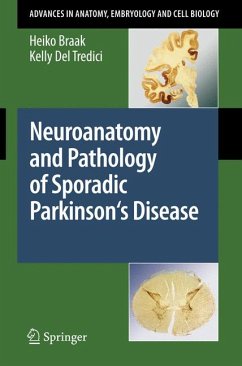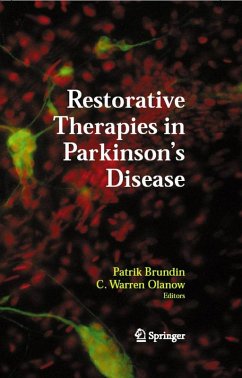
Macro Roles for MicroRNAs in the Life and Death of Neurons (eBook, PDF)
Versandkostenfrei!
Sofort per Download lieferbar
112,95 €
inkl. MwSt.
Weitere Ausgaben:

PAYBACK Punkte
56 °P sammeln!
biologyinneuronalprocessesandinbraindisorders. BartdeStrooper YvesChristen v Acknowledgments The editors wish to thank Jacqueline Mervaillie and Sonia Le Cornec for the organizationofthemeetingandMaryLynnGagefortheeditingofthebook. vii Contents Pro?lingthemicroRNAs . . . . . . . . . . . . . . . . . . . . . . . . . . . . . . . . . . . . . . . . . . . . . . . . . . . . . . 1 KennethS. Kosik,ThalesPapagiannakopoulos,NaXu, KawtherAbu-Elneel,TsunglinLiu,andMinJeongKye TheWideVarietyofmiRNAExpressionPro?les intheDevelopingandMatureCNS . . . . . . . . . . . . . . . . . . . . . . . . . . . . . . . . ....
biologyinneuronalprocessesandinbraindisorders. BartdeStrooper YvesChristen v Acknowledgments The editors wish to thank Jacqueline Mervaillie and Sonia Le Cornec for the organizationofthemeetingandMaryLynnGagefortheeditingofthebook. vii Contents Pro?lingthemicroRNAs . . . . . . . . . . . . . . . . . . . . . . . . . . . . . . . . . . . . . . . . . . . . . . . . . . . . . . 1 KennethS. Kosik,ThalesPapagiannakopoulos,NaXu, KawtherAbu-Elneel,TsunglinLiu,andMinJeongKye TheWideVarietyofmiRNAExpressionPro?les intheDevelopingandMatureCNS . . . . . . . . . . . . . . . . . . . . . . . . . . . . . . . . . . . . . . . . . . 9 MarikaKapsimali InteractionsbetweenmicroRNAsandTranscription FactorsintheDevelopmentandFunction oftheNervousSystem . . . . . . . . . . . . . . . . . . . . . . . . . . . . . . . . . . . . . . . . . . . . . . . . . . . . . . . . 19 DavidJ. Simon AmicroRNAFeedbackCircuitinMidbrainDopamineNeurons . . . . . . . . . 27 AsaAbeliovich Fine-tuningmRNATranslationatSynapseswithmicroRNAs . . . . . . . . . . . . 35 GerhardM. Schratt NeuronalP-bodiesandTransportofmicroRNA-Repressed mRNAs . . . . . . . . . . . . . . . . . . . . . . . . . . . . . . . . . . . . . . . . . . . . . . . . . . . . . . . . . . . . . . . . . . . . . . . . . 45 FlorenceRage CrosstalkbetweenmicroRNAandEpigeneticRegulation inStemCells . . . . . . . . . . . . . . . . . . . . . . . . . . . . . . . . . . . . . . . . . . . . . . . . . . . . . . . . . . . . . . . . . . . 57 KeithSzulwach,ShuangChang,andPengJin microRNAsinCNSDevelopmentandNeurodegeneration: InsightsfromDrosophilaGenetics . . . . . . . . . . . . . . . . . . . . . . . . . . . . . . . . . . . . . . . . . . . 69 StephenM. Cohen ix x Contents DrosophilaasaModelforNeurodegenerativeDisease: RolesofRNAPathwaysinPathogenesis . . . . . . . . . . . . . . . . . . . . . . . . . . . . . . . . . . . . 79 NancyM. Bonini microRNAsinSporadicAlzheimer'sDiseaseandRelated Dementias . . . . . . . . . . . . . . . . . . . . . . . . . . . . . . . . . . . . . . . . . . . . . . . . . . . . . . . . . . . . . . . . . . . . . . 91 Se¿bastienS. He¿bert,WimMandemakers,AikateriniS. Papadopoulou, andBartDeStrooper microRNADysregulationinPsychiatricDisorders . . . . . . . . . . . . . . . . . . . . . . . . 99 BinXu,JosephA. Gogos,andMariaKarayiorgou Index . . . . . . . . . . . . . . . . . . . . . . . . . . . . . . . . . . . . . . . . . . . . . . . . . . . . . . . . . . . . . . . . . . . . . . . . . . . 119 Contributors Abeliovich Asa Columbia University Medical Center, 630 West 168th Street, Room15-405,NewYork,NY10032,USA,aa900@columbia. edu Abu-ElneelKawther NeuroscienceResearchInstitute,DepartmentofMolecular CellularandDevelopmentalBiology,UniversityofCaliforniaSantaBarbara,USA BoniniNancyM. UniversityofPennsylvania,306LeidyLaboratories,Depa- mentofBiology,Philadelphia,PA19104,USA,nbonini@sas. upenn. edu Chang Shuang Department of Human Genetics, Emory University School of Medicine,Atlanta,GA30322,USA CohenStephenM. TemasekLifeSciencesLaboratoryLimited,1ResearchLink National University of Singapore, 117604 Singapore, SINGAPORE, steve@ tll. org. sg DeStrooperBart Centerforhumangenetics,K. U. LeuvenandDepartmentof molecularanddevelopmentalgenetics,VIBLeuven,BELGIUM GogosJosephA. DepartmentofPhysiology&CellularBiophysicsandDepa- mentofNeuroscience,ColumbiaUniversity,NewYork,USA He¿bert Se¿bastien S. Centre de Recherche du CHUQ (CHUL), Axe Neur- ciences,Universite¿Laval,De¿partementdeBiologieme¿dicale,2705Boul. Laurier, LocalRC-9800,Que¿bec,Qc,Canada,sebastien. hebert@crchul. ulaval. ca JinPeng DepartmentofHumanGeneticsandGraduatePrograminGeneticsand MolecularBiology,EmoryUniversitySchoolofMedicine,Atlanta,GA30322, USA,pjin@genetics. emory. edu ¿ ¿ ¿ ¿ KapsimaliMarika INSERMU784,GenetiqueMoleculaireduDeveloppement, ¿ Ecole Normale Superieure, 46 rue d¿Ulm, 75230 PARIS Cedex 05 FRANCE, kapsimal@biologie. ens. fr xi xii Contributors Karayiorgou Maria Columbia University, Department of Psychiatry, 1051 RiversideDrive,Unit#28,NewYorkNY10032,USA,mk2758@columbia. edu Kosik Kenneth S. Neuroscience Research Institute, Department of Molecular Cellular and Developmental Biology, University of California Santa Barbara, BiologyII,Room6139A,SantaBarbara,CA93106,USA,kosik@lifesci. ucsb.
Dieser Download kann aus rechtlichen Gründen nur mit Rechnungsadresse in A, B, BG, CY, CZ, D, DK, EW, E, FIN, F, GR, HR, H, IRL, I, LT, L, LR, M, NL, PL, P, R, S, SLO, SK ausgeliefert werden.













